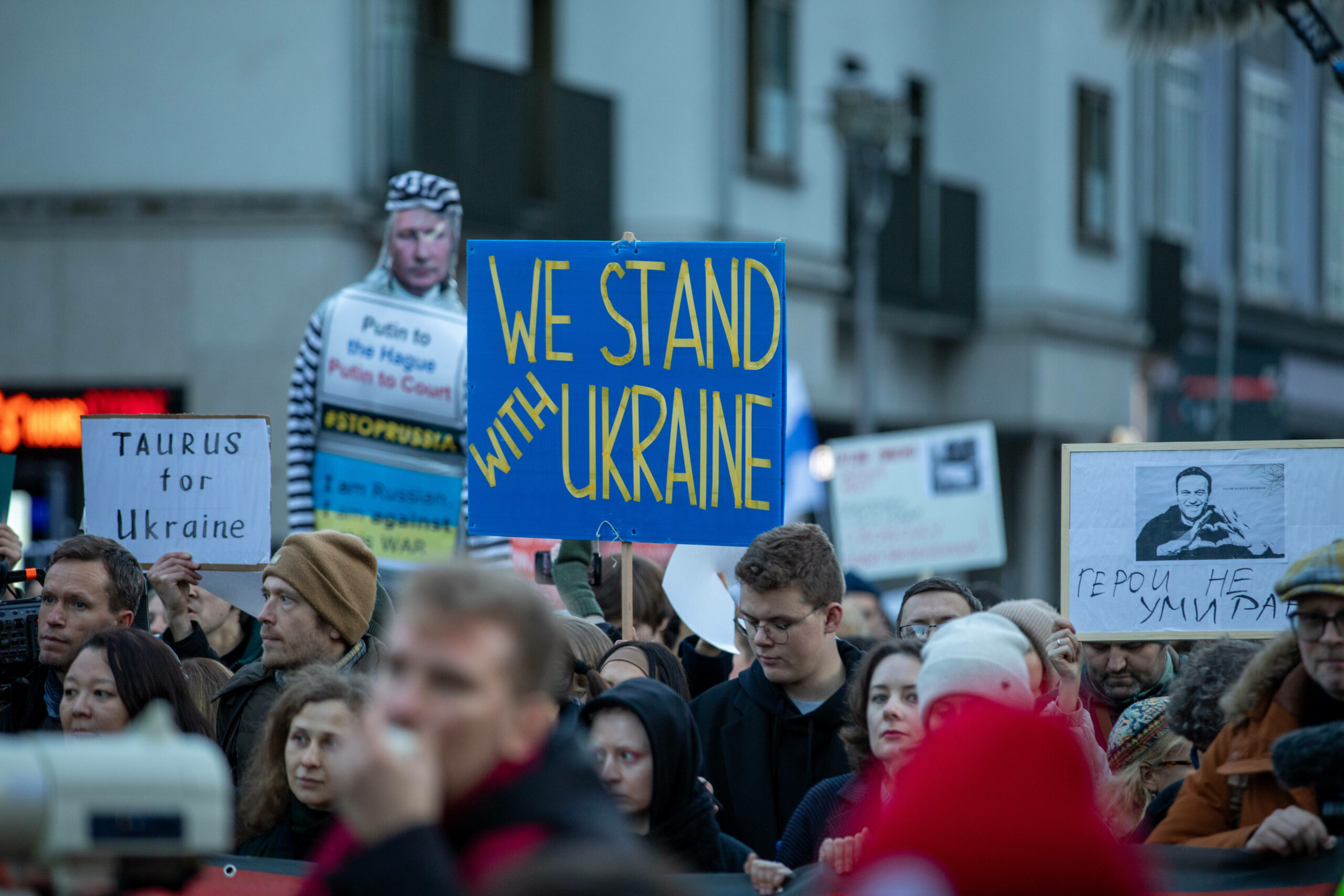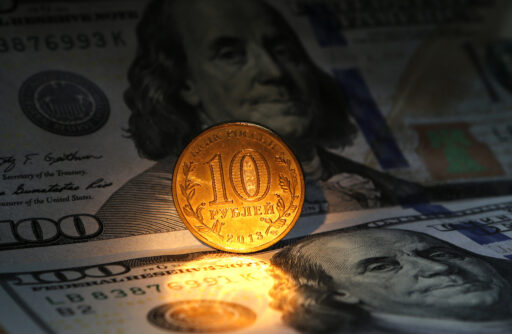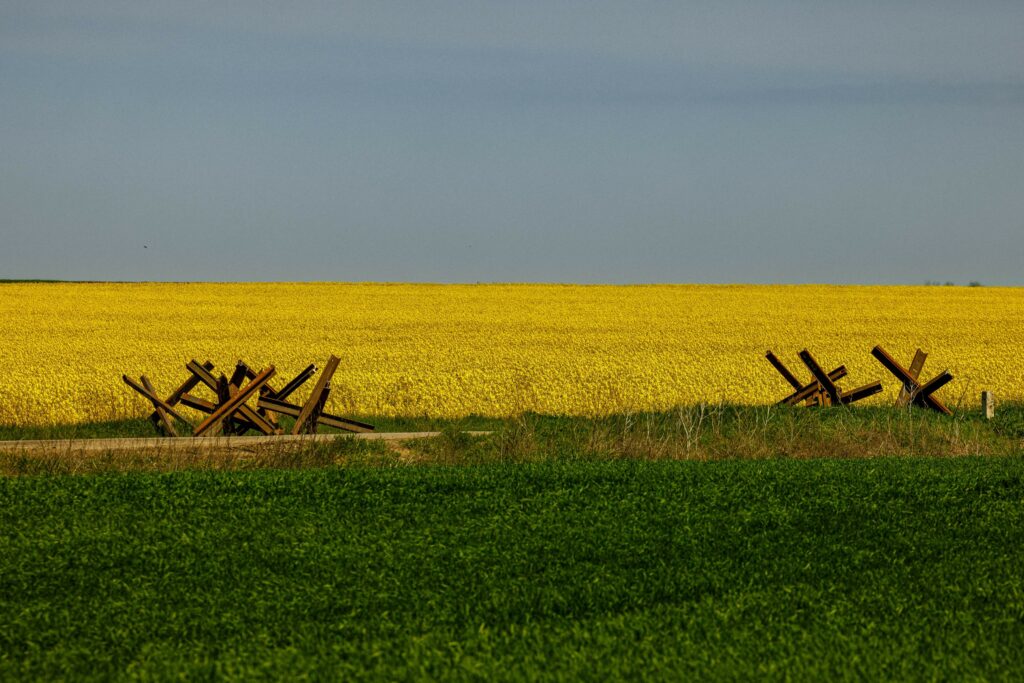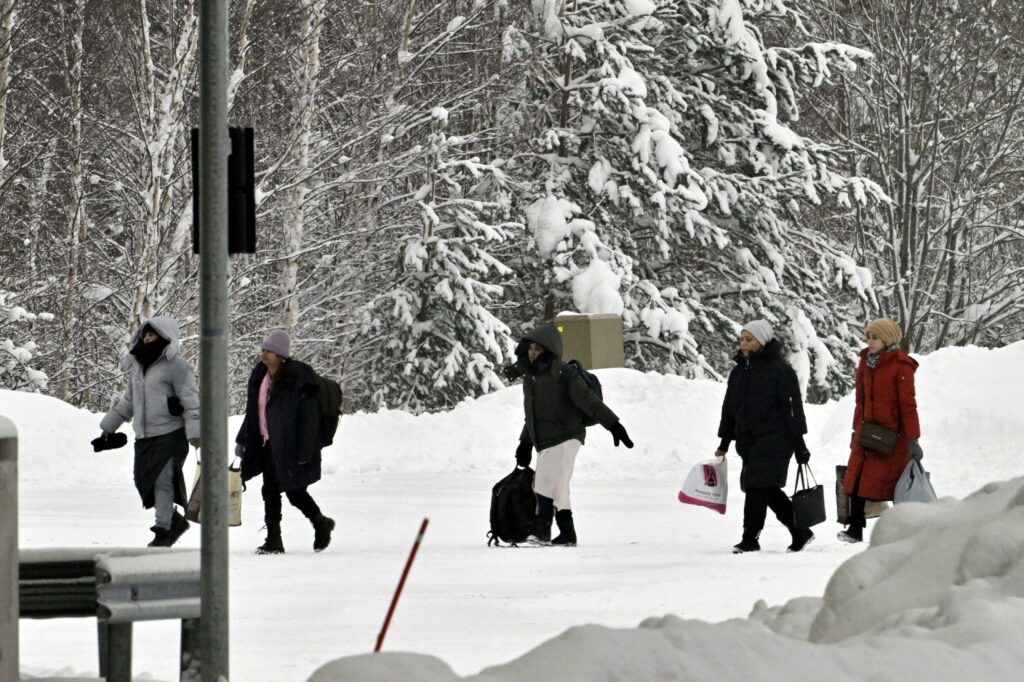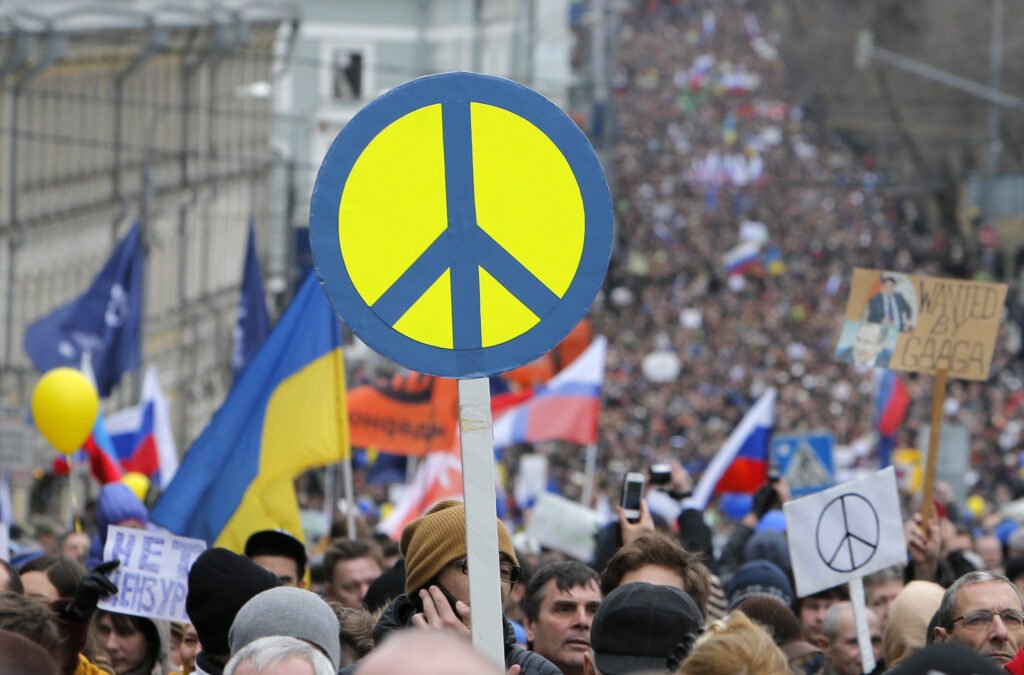Aleksandar Djokic’s article published on Riddle Russia is an important and insightful study of the contradictions between the interests of Ukraine and the Russian opposition. The author successfully demonstrates the diversity of existing viewpoints and convincingly argues that the war and its consequences represent not only a political challenge, but also a complex moral dilemma for both Ukraine and the Russian opposition.
At the outset of the war, the interests of the Russian opposition and those of Ukraine largely aligned in many respects. However, much has changed since the start of the full-scale invasion, including Ukraine’s official policies towards Russian civil society. In March 2022, President Volodymyr Zelensky addressed the Russian people, advising them to leave Russia, and gave interviews to Russian opposition journalists. However, already in August 2022, he called on Western countries to expel all Russians back to Russia, regardless of their political views. Meanwhile, the participation of Russian volunteer formations—such as the Russian Volunteer Corps (RDK)—on Ukraine’s side failed to arouse much understanding or support within large segments of Russian society.
For quite natural reasons, the interests of Ukraine and the Russian opposition cannot fully coincide. The Russian opposition, as a political actor, must consider its future in Russia and its ability to engage with potential voters. The language it uses to communicate with Russians cannot solely rely on punishment and reproach. On the other hand, as long as Russia’s horrific war against Ukraine continues, it is unrealistic to expect understanding from Ukrainian society. Years of aggression have left a deep imprint on the relations between the two nations. Nevertheless, the author raises an important topic that warrants discussion, as it directly impacts the future of both countries and prospects for eventual reconciliation.
Let us delve into a more detailed breakdown of the contentious points raised in the article.
Aleksandar Djokic writes: ‘every dollar or euro going to the Russian opposition and their projects is capital that might have gone to support the Ukrainian war effort or its civil society’. This contradiction appears rather artificial. Framing this issue as an ‘either-or’ dichotomy seems misguided, as the U.S. had allocated considerable funds to various causes other than Ukraine even before the full-scale war began. Moreover, the scale of potential support for the Russian opposition from political foundations can hardly be compared to the scale of aid provided to Ukraine. According to U.S. estimates, the latter has totalled USD 175 billion since 2022. Also worth noting is that when allocating money to the Russian opposition, the EU and U.S. authorities are guided by their respective national interests. It appears that the U.S. and EU policies on this matter can follow multiple vectors, reflecting a broader interest of both sides in de-escalation and ensuring a democratic trajectory for Russia.
The author also touches upon the topic of Russian citizens’ donations to Ukraine, noting that this is ‘a very acute point of moral conflict for Ukrainians and dissident Russians‘. This claim can be divided in two parts. The first one concerns the donations themselves. Many Russian dissidents supported Ukrainians from the first days of the war by organising numerous fundraising campaigns, volunteering and collecting humanitarian aid. Let us recall, for example, the concerts by artists like Monetochka or Oxxxymiron, which raised tens of thousands of dollars for Ukrainian refugees. The second part pertains to donations made specifically to the Armed Forces of Ukraine (AFU). This issue is not only moral and ethical, but also legal. Donations to the AFU by Russian citizens have led to criminal cases and prison sentences (for example, Ksenia Karelina faced prosecution after transferring funds to the AFU via a foreign bank card). It should also be remembered that not all émigrés have left Russia once and for all; many are compelled to return for family or other reasons, risking their freedom. Furthermore, there is the moral dilemma faced by Russian émigrés who support Ukraine in its just war, but, due to humanitarian considerations, do not wish death to their fellow citizens.
The author then addresses the issue of war crimes and the accountability of the Russian leaders in that regard: ‘In the end, there is a Ukrainian interest for the Russian political and military leadership to be tried in an international court of law, like Milosevic and his colleagues stood trial for the crimes in the Yugoslav Wars‘. The Russian opposition is no less interested than the Ukrainian authorities in bringing war criminals to justice and punishing those responsible for unleashing war and political repression. For example, the ‘15 theses of a Russian citizen who desires the best for their country’, published by Alexei Navalny in March 2023. In point 8 he proposes that ‘War crimes committed during this war must be investigated in cooperation with international institutions‘, and in point 13 he calls for ‘dismantling the Putin regime and its dictatorship‘. The jurisdiction where Russia’s war crimes will be tried is a matter of discussion, but not a contradiction. Russian opposition figures and human rights activists have also supported the ICC’s arrest warrant against Putin.
The author proceeds to discuss the purpose of the war: ‘Thus, the Russian opposition does agree that Putin should stop the war and return to 1991 borders, but only parts of the Russian opposition support Ukraine’s war effort and the notion of actually defeating Russia‘. The Russian opposition takes this stance without insisting that Russia should be defeated because, fundamentally, they are the Russian opposition. Their potential voters and supporters are within Russia, and the opposition’s slogans must resonate with the public and gain voluntary acceptance. The Russian opposition cannot address its people by using the same slogans that Ukrainians use when speaking about Russians. Framing the Russian opposition as an ‘external’, ‘occupying’ force among the Russian people would do a great disfavour to Ukraine.
Djokic also touches upon Russia’s future: ‘The clear divergence [between Russia and Ukraine] comes only in theorizing what a defeated post-war Russia should look like. Should it be a Russia which pays reparations, humiliated on a global stage, with its leadership in the court in the Hague, maybe with its borders shrunk, or should it be a flourishing democratic Russia, which immediately rejoins Europe and goes to business as usual, but with an entirely new political system and image?‘ In reality, a prosperous democratic Russia would be interested in restoring justice, punishing war criminals, paying reparations to Ukraine and normalising relations with it. Russia’s shift towards reconciliation, renunciation of aggression, and democratic governance would likely be accompanied by the gradual lifting of sanctions, restoration of economic ties and reintegration into the global economy. Support for Ukraine’s reconstruction may be linked, to some extent, with the lifting of sanctions. Even Navalny himself saw reparations as an essential prerequisite for Russia’s future in his 15 theses: ‘Together with Ukraine, the U.S., the EU and the UK, we must look for acceptable ways to compensate for the damage done to Ukraine. One way to achieve this would be lifting the restrictions imposed on our oil and gas, but directing part of the income Russia receives from hydrocarbon exports towards reparations‘.
The topic of Russia’s defeat is further explored by the author in the following passage: ‘Clearly, Ukraine’s interests lie in «Making Russia Small Again», Ukraine’s neighbours share this interest too. A ‘smaller’ Russia, in every way lesser, would never again pose a threat to those nations which were once a part of the Russian and Soviet empires‘. However, such a development (namely ‘decolonisation’ and the collapse of Russia) is primarily opposed by the West. After the collapse of the USSR, it was the U.S. that pressured all post-Soviet republics to hand over the nuclear weapons stationed on their territories to Russia (for more on Ukraine’s nuclear disarmament in the 1990s and the role of the U.S. and Europe in this process, see Mariana Budjeryn’s book ‘Inheriting the Bomb‘). Throughout the current war, both the EU and the US have worked to moderate escalation and avoid situations where Russia would become uncontrollable. This logic has underpinned their approach to supplying arms to Ukraine. It was barely enough to defend current positions, but not to inflict a strategic defeat on Russia. The policy aimed at dismantling Russia directly contradicts the current political course pursued by the EU and the U.S. Both actors are Ukraine’s key partners, and Kyiv will also have to reckon with their interests.
The author also touches upon Russia’s reintegration: ‘This supposes that a defeated Russia would quickly be able to be reintegrated into Europe. This would not be in Ukraine’s interest, for the country that has only recently tried to annihilate it becoming a major player in the region once more‘. Regardless of the scenario, Russia and Ukraine will remain neighbours, just as Germany and France did after World War II. Neighbourhood does not necessitate eternal war between the countries. Establishing post-war peaceful relations is a crucial task for the leadership of both countries. Even in conditions of war and isolation, Russia remains a major player in the post-Soviet space. The key question is where its future efforts will be directed.
Djokic notes: ‘Navalnaya and Yashin often define Russia’s war on Ukraine as ‘Putin’s war’ as well. But if Putin has not produced an expansionist Russia, but Russia’s history and dominant polit-cultural markers have produced Putin, then the image changes completely‘. However, the term ‘Putin’s war’ is not exclusive to Navalnaya and Yashin; it has been used by the German Foreign Ministry and Joe Biden. The idea to separate the Russian people from Putin’s regime already resounded in the rhetoric of Western leaders early in the war: Olaf Scholz, Boris Johnson, and Joe Biden all spoke about it. This is why the Russian opposition is receiving attention from Western elites, and why Vladimir Kara-Murza, Yulia Navalnaya and Ilya Yashin are being received by the heads of state in France, the United States and Germany. The argument that Russia’s history predetermined its war against Ukraine is ultimately fatalistic. A similar approach could ‘historically’ rationalise the dictatorship in North Korea. Russia’s current war cannot be limited to historical determinism. In August 1991, it was the resistance of Russians that ultimately broke the Soviet regime and predetermined the collapse of the USSR. The history of Russia provides a variety of examples and is not limited to dictatorship and unfreedom.
That said, I can fully agree with the author’s conclusions: ‘There will hardly be a reconciliation of interests of the Russian opposition and those of Ukraine on how a post-war Russia should look like. (…) What matters most is the current struggle and what both the Russian opposition and Ukraine could do is not get in each other’s way‘.
